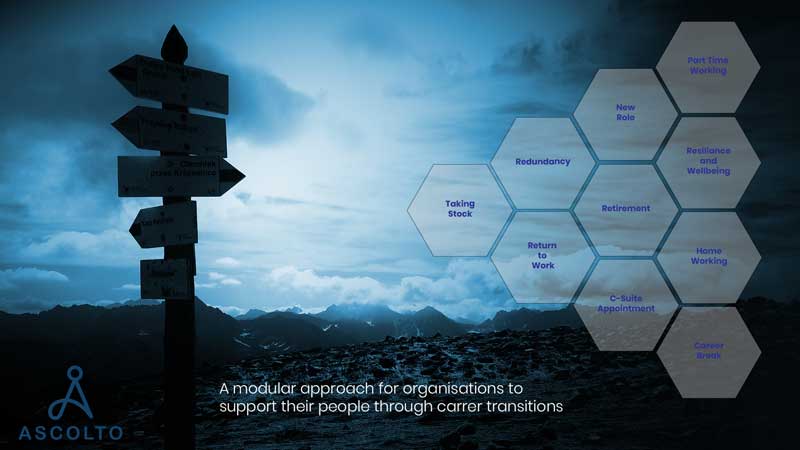Career Transitions
Any individual’s approach to managing career transitions should always start with a clear self-assessment of their strengths, their work and their home situations, in order to find their options
“Work to become, not to acquire.”
Elbert Hubbard
About Career Transitions
In the last couple of decades there has been an active debate about the ownership of career management. On the one side the argument being made for organizations to take responsibility, on the other – for individuals.
At Ascolto we believe in responsibilities and benefits for both, and that the best outcomes from an involved organisation and a proactive individual. [1]
- Organisations need to grow future specialists and leaders. Effectively managing the career transitions for their staff enables workers to be well-informed and be ready for new set of responsibilities and roles.
- Organisations need to retain high quality workers. Providing them support to make the most of their career will encourage them to remain in the organization.
- Organisations also have to manage their internal and external reputations. Being seen to do right by those leaving – on a job move, redundancy or retirement – reinforces a reputation that supports employee engagement and recruitment.
- Organisations have a responsibility to support employees who wish to work flexibly. This involves the decision, the event and the return to work.
But also individuals need to recognise that the entirely benevolent organisation that developed them through a job for life is no longer. There is more importance now for each of us to manage their own development portfolio as we progress our careers – as many organisations will support us in our development whilst we are with them.
Individual’s personal engagement in managing their own careers – both with, and independent of organisations – is likely to provide them more successful and satisfactory career outcomes. [1][2]
What works in managing transitions?
An individual’s approach to managing career transitions should always start with a clear self-assessment of their strengths, their work and their home situations, in order to find their options. We have come across too many people who have taken an ‘obvious’ career choice only to find that it doesn’t match with their strengths, their values and/or their life aspirations. These mistaken choices are costly for them as individuals, and for organisations too.
This ‘Taking Stock’ activity usually leads to a fork in the road – with options and possibilities. Each of the possible paths involves a transition, and that transition often benefits from management and support. This might be, for example, coaching support for a C-Suite role; new exec onboarding; education and coaching to support a return to work; redundancy or retirement outplacement support; job hunting or interview skills or one of the many other opportunities.
These interventions might be entered into at the organisation’s, or the individual’s initiative. Respective needs and outcomes may not align, and organizations need to ensure their career management support aligns with their business situation. [3]
What we do
We work with private and public organisations, as well as private individuals, to support people through career transitions – career change situations both elective and unexpected. With our help our clients find themselves in a better position to create a thoughtful and appropriate future for themselves, and for the other important people in their lives. We also support them in the early stages on making their next transition.
What our clients have said
David is a hugely intelligent man with a fund of ideas about how to go about solving the innumerable problems of any larger enterprise. His greatest asset is that he realises that it is only through the people that this can be done, and his coaching and mentoring skills are excellent. David is someone who gets a true sense of achievement from seeing others do well – and anyone who recognises the real rarity of that trait will also appreciate what David has to offer.
Kris was my coach when I was a student on the Police Strategic Command Course and I have worked with her over a number of years since. She understands the challenges that senior leadership provides and helps people to develop their skills and abilities to tackle those challenges effectively to become the best they can be. Kris encourages her clients to take time to think and pause and consider where they are with their roles and their leadership, and then to plan ahead. In the sometimes manic world in which we operate this time is invaluable and Kris’s calm, considered and highly skilled approach provides the perfect environment for reflection and strategic thinking. Kris’s coaching and people skills together with her personal integrity that mean that for anyone in leadership roles, or for those thinking about embarking upon that journey she would be the perfect coach to work with. I cannot recommend her highly enough
Bibliography
| [1] | B. Renee Barnett, and L. Bradley, “The impact of organisational support for career development on career satisfaction”, Career Development International, Vol. 12 No. 7. |
| [2] | K. Whymark and S. Ellis, “Whose career is it anyway? Options for career management in flatter organisation structures”, Career Development International, Vol. 4 No. 2. |
| [3] | S. Stumpf, “Choosing Career Management Practices to Support Your Business Strategy” Human Resource Planning, Vol 11 Issue 1, 1998. |

